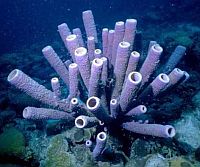 All terrestrial life came from the sea, but how did life develop in the ocean? Professor Tim Lenton of the University of Exeter, who led a new study, said: “There had been enough oxygen in ocean surface waters for over 1.5 billion years before the first animals evolved, but the dark depths of the ocean remained devoid of oxygen. We argue that the evolution of the first animals could have played a key role in the widespread oxygenation of the deep oceans. This in turn may have facilitated the evolution of more complex, mobile animals.”
All terrestrial life came from the sea, but how did life develop in the ocean? Professor Tim Lenton of the University of Exeter, who led a new study, said: “There had been enough oxygen in ocean surface waters for over 1.5 billion years before the first animals evolved, but the dark depths of the ocean remained devoid of oxygen. We argue that the evolution of the first animals could have played a key role in the widespread oxygenation of the deep oceans. This in turn may have facilitated the evolution of more complex, mobile animals.”
And what were these animals that oxygenated the oceans? Sponges, according to the the new research. Sponges may lack the brains and other organs of more complex animals, but they are animals nonetheless, and around 700 million years ago, sponges began to flood the oceans with oxygen. The oceans had had relatively little oxygen and could not support more complex life.
First animals oxygenated the ocean, study suggests
Sponges feed by pumping water through their bodies, filtering out tiny particles of organic matter from the water, and thus helping oxygenate the shelf seas that they live in. This naturally selects for larger phytoplankton – the tiny plants of the ocean – which sink faster, also reducing oxygen demand in the water.
By oxygenating more of the bottom waters of shelf seas, the first filter-feeding animals inadvertently increased the removal of the essential nutrient phosphorus in the ocean. This in turn reduced the productivity of the whole ocean ecosystem, suppressing oxygen demand and thus oxygenating the deep ocean.
A more oxygen-rich ocean created ideal conditions for more mobile animals to evolve, because they have a higher requirement for oxygen. These included the first predatory animals with guts that started to eat one another, marking the beginning of a modern marine biosphere, with the type of food webs we are familiar with today.
Professor Lenton, of Geography, added: “The effects we predict suggest that the first animals, far from being a passive response to rising atmospheric oxygen, were the active agents that oxygenated the ocean around 600 million years ago. They created a world in which more complex animals could evolve, including our very distant ancestors.”
Professor Simon Poulton of the University of Leeds, who is a co-author of the study, added: ″This study provides a plausible mechanism for ocean oxygenation without the requirement for a rise in atmospheric oxygen. It therefore questions whether the long-standing belief that there was a major rise in atmospheric oxygen at this time is correct. We simply don’t know the answer to this at present, which is ultimately key to understanding how our planet evolved to its current habitable state. Geochemists need to come up with new ways to decipher oxygen levels on the early Earth.

Poriferans are amazing and don’t get the respect they deserve.
I know it’s a complete change of subject, and I apologize for that. But did you hear that Hobart Alter passed away today?